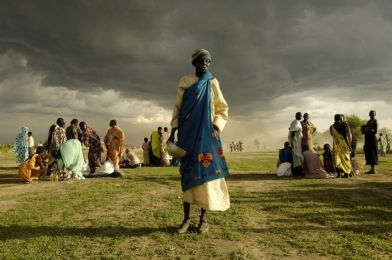Sudan turns down mediation’s proposal to settle Abyei issue
September 25, 2012 (ADDIS ABABA) – Sudan rejected a proposal submitted by the African Union mediation aiming at breaking the deadlock over Abyei referendum saying it ignored that the eligibility of Misseriya was the main cause of discord.

The African mediation, on 21 September before the meeting proposed to the two parties to hold a referendum on Abyei where the Ngok Dinka and the Misseriya settled in the region can vote to determine the future of the area.
The two countries failed to hold a referendum on whether Abyei can remain in the north or join South Sudan because they disagree on the eligibility of the Misseriya nomads who spend several months in Abyei every year for grazing.
Khartoum started its letter by blaming the mediation for taking the side of South Sudanese government and ignoring its position on the eligibility of Misseriya. It further stressed that the panel had to focus on resolving the “only pending issue” of who can participate in the vote.
“The government of Sudan, whose position on this matter is ignored altogether, has no alternative but to categorically reject the proposal in its entirety,” Khartoum said in a letter handed to the mediation seen by Sudan Tribune.
“The proposal contradicts the Abyei protocol which does not provide for permanent abode or residence as a condition for voting in the referendum. It also contradicts Abyei protocol by not observing the parity between the Misseriya nomads and Dinka Ngok in power and resource sharing,” the letter reads in part accusing the mediation of “stripping” the Misseriya rights.
Juba accepted the proposal which calls to give South Kordofan 20% of Abyei oil revenue during a period of 5 years for development projects.
In its rejection letter, Khartoum says that the proposal should abide by the 2005 peace deal which provided specific protocol on the future of Abyei and the 2010 Abyei Referendum Act.
The letter also mentioned that Sudan’s accepted proposal made by US Special Envoy, Scott Gration together with the African Union panel which recommends either division of the area by presidential decree or to allow the participation of Miseriya who have resided in the area for a minimum of 185 days.
Juba after two months talks (October –November 2010) brokered by the US special envoy, rejected Gration’s plan saying it breaches the rule of the Permanent Court of Arbitration (PCA) which gave South Sudan most of the land including Abyei town and huge areas of fertile land.
Sudan, in its letter to the mediation, also warned against conducting a referendum which excludes one of the two rival communities, recommending that the AU panel uses the previous proposal of 27 November 2010 which recommends the division of the area by the presidential decree.
Khartoum says the partition of the region – northern part goes to the Sudanese government and southern part transferred to the South – accommodate the interests of both sides.
“It is futile to think of any referendum on Abyei that excludes one of the two communities. Far from advancing a win-win formula, such exclusion, if agreed, is a likely recipe for instability and strife in the Abyei Area,” the letter further warns in part.
The Sudanese government also demands the formation of a joint Abyei administration and recognition of the Misseriya as residents of the area and for them to participate in the referendum vote, without limiting their rights to access to water and pastures.
Khartoum and Juba governments are under huge pressure from the two communities of Ngok Dinka and Misseriya which were involved in the North –South war before the independence of South Sudan.
Abyei’s referendum was initially agreed to be simultaneously held with the vote on the independence of South Sudan. The establishment of a new state in the South after six year interim period marred by mistrust and difficulties complicates the ongoing efforts to settle Abyei issue.
South Sudan rejected Khartoum’s demands to include the Misseriya nomads in the vote and its proposal seeking division of the area as well as allocation of equal share of resources generated from the region, describing Sudan’s demands as irrational.
Juac Agok, deputy chairperson of South Sudan’s governing SPLM in Abyei accused Khartoum government of always seeking to grab the land of Ngok Dinka.
“There is no way Missiriya can be allowed to vote because the area of Abyei has been clearly defined by the Permanent Court of Arbitration. The referendum in Abyei will therefore be conducted in the area defined by the court,” Juac said on Tuesday.
He called on the Government of South Sudan to make its position on the issue clear, explaining the issue was no longer between the two communities. He also called on members of the Dinka Ngok to “defend” the area.
“What do you do when someone wants to take your house, your land by force?” asked Agok. “If you are overpowered you go and prepare and come back when you have gained momentum. The issue of land everywhere is never easy,” he said.
South Sudan’s information minister Barnaba Marial Benjamin said that the presidential summit had resumed on Tuesday and was still “progressing well” in the Ethiopian capital, Addis Ababa.
He went further to say that the two presidents are determined to a reach peaceful settlement on all outstanding issues.
In Addis Ababa the mediation announced that the talks are extended to Friday to allow the two presidents to strike a comprehensive deal on the outstanding issues.
(ST)
